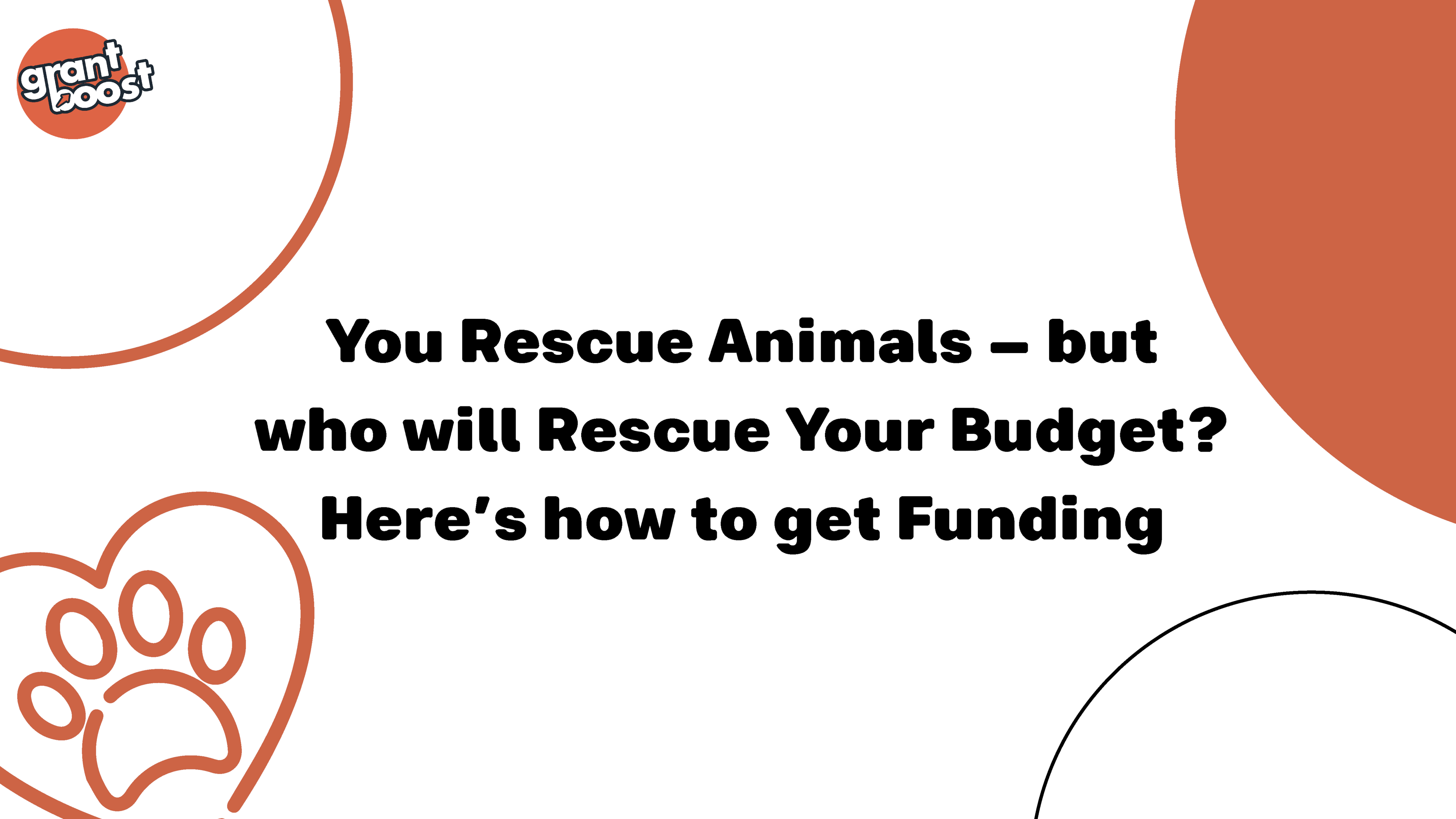
Animal rescue organizations play a vital role in saving and improving the lives of animals in need. Yet securing adequate funding remains one of their biggest challenges. Grant opportunities can provide essential financial assistance, but navigating the complex landscape of deadlines, eligibility requirements, and application processes can be overwhelming.
This comprehensive guide will help you:
Discover 10+ current animal rescue grants with upcoming deadlines in 2025-2026
Understand key eligibility requirements for major animal welfare foundation funding
Master practical application strategies to increase your chances of success
P.S., Teams using AI-powered grant writing tools like Grantboost are handling their entire monthly grant workload in a fraction of the time.
Stick around to learn how they’re doing it 😉
For individuals and teams looking to secure more funding with less effort. Streamline your grant-writing process, stay organized, and achieve better results with proven templates and AI-driven proposals.
| Grant Program | Amount | Eligibility | Deadline |
|---|---|---|---|
| Petfinder Grants (access to care, Other Animals, Senior Pet Adoption, P.L.A.Y. Pet Beds,) | Varies | Active Petfinder members | Rolling (varies by grant) |
| PetSmart Grants (Natural Disaster Response, Adoption Partner Rewards) | Varies | Animal welfare organizations, adoption partners | Varies (depends on grant) |
| Petco Love Grants (Access to Care, Vaccinated and Loved) | Varies | Animal welfare organizations | Varies (depends on grant) |
| Banfield Foundation Grants (HOPE Funds, Care Knows no boundaries) | Varies | Employed by Mars, Inc. companies like Banfield | Ongoing |
| Grey Muzzle Organization Grants | $1,500 - $25,000 | Organizations focused on senior dog welfare | February 2026 |
| Cold Noses Foundation Grants | $2,000 - $5,000 | Education, community outreach, and medical care programs | Varies by region |
| American Humane Second Chance Grant | Varies | Organizations providing specialized medical care | 1st and 15th of each month |
| Athletes for Animals Grant | $500 - $2,500 | 501(c)(3) animal welfare organizations | Spring & Fall cycles |
| The Binky Foundation - Forward Steps Grant | $1,000 | By invitation only; available to organizations previously awarded the First Steps Grant | 1st quarter post-First Steps Grant |

The Petfinder Foundation offers grants designed to help animal welfare organizations increase adoption rates and improve the quality of life for animals in their care.
Amount: $1,000
Eligibility: Active Petfinder members working with animals beyond cats and dogs
Deadline: Rolling applications accepted year-round; reviewed monthly
This grant supports organizations that rescue and rehome less common companion animals such as rabbits, guinea pigs, birds, reptiles, and small mammals. The funding can be used for medical care, housing improvements, and adoption support for these often-overlooked animals.
Many rescue groups focus primarily on dogs and cats, creating a funding gap for organizations working with other specific species. This grant helps fill that gap, providing dedicated financial resources for the unique needs of these animals.
Application tip: When applying, clearly highlight the specific challenges faced when rescuing and rehoming these animals, such as specialized housing requirements or unique medical needs that differ from traditional companion animals.
Amount: $1,000
Eligibility: Active Petfinder members with senior pet adoption programs
Deadline: Rolling applications; reviewed quarterly (March, June, September, December)
Designed to help offset the costs associated with caring for and finding homes for senior pets, this grant recognizes the additional challenges these animals often face.
Application tip: Include specific data on your senior animal intake, average length of stay, and adoption rates compared to younger animals to demonstrate the need for funding.
Amount: 10 Chill pads monthly
Eligibility: Active Petfinder members
Deadline: Monthly review cycle; applications due by the 15th of each month
This in-kind grant provides comfortable, durable pet beds to improve the quality of life for animals in shelters. These beds offer comfort to animals awaiting adoption and can go home with them when adopted, providing continuity during the transition.
Organizations are selected based on:
Demonstrated need for bedding
Number of animals served
Geographic location (grants are awarded by state on a rotating schedule)
Application tip: Include photos of your current bedding situation and explain how new beds would improve animal welfare in your facility.
Amount: $100 to $1,000
Eligibility: Active Petfinder members with dog enrichment programs
Deadline: Rolling applications; awarded on a monthly basis.
This grant supports activities and equipment that improve the mental and physical wellbeing of dogs in shelters, including toys, training programs, and behavioral support.
Successful applications typically include:
Specific enrichment activities planned
Number of dogs that will benefit
Expected outcomes (reduced stress, improved behavior, etc.)
Methods for measuring success
Application tip: Research shows that enrichment activities significantly reduce length of stay in shelters. Include this research in your application to strengthen your case.
Amount: Toy donation
Eligibility: Active Petfinder members
Deadline: Quarterly review (January, April, July, October)
The grant provides durable Kong toys that help reduce stress and boredom for dogs in shelter environments.
The number of toys awarded depends on:
Organization size
Number of dogs served
Current enrichment resources available
Application tip: Explain how you’ll use Kong toys as part of a comprehensive enrichment program, not just as standalone items.
Amount: $100 - $1,000
Eligibility: Active Petfinder members. The amount can be used for ONE PET in need of emergency medical care.
Deadline: applications are accepted year-round and awarded monthly
This grant offers emergency funding for unexpected veterinary expenses for animals in rescue care, helping organizations save animals that require immediate medical intervention. These funds can be the difference between life and death for animals with critical needs.
Successful applications include:
Detailed description of the medical emergency
Veterinary diagnosis and treatment plan
Cost estimates from veterinarians
Photos of the animal (when appropriate)
Application tip: Include a letter from your veterinarian confirming the diagnosis, treatment plan, and urgency of the situation.
Amount: Up to $10,000
Eligibility: Organizations affected by natural disasters
Deadline: Grants are awarded throughout the year in varying amounts
This grant provides emergency funding to animal welfare organizations impacted by natural disasters such as hurricanes, floods, wildfires, or other catastrophic events. Funds can be used for evacuation, temporary sheltering, supplies, and recovery efforts.
Organizations must demonstrate:
Direct impact from a declared disaster
Immediate needs for animal care
Plan for using funds effectively during emergency response
Application tip: Document the disaster’s impact with photos, news reports, and official disaster declarations to strengthen your application.
Looking to apply for multiple grants but feeling overwhelmed? Grantboost can help! Simply paste or input grant opportunity details, and the AI will extract and analyze the information to craft effective, tailored responses—saving you time and ensuring your proposals align with each grant’s specific requirements.
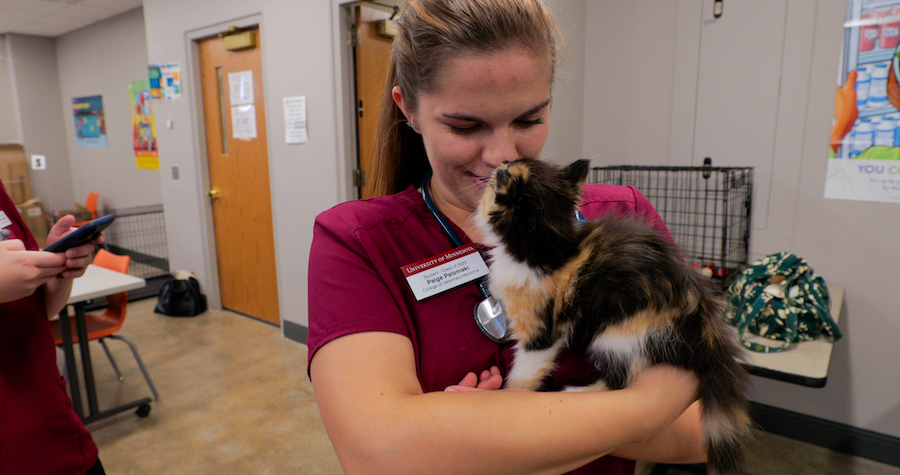
PetSmart Charities is one of the largest funders of advance animal welfare in North America, offering several grant programs for rescue organizations.
Amount: Varies based on need
Eligibility: Animal organizations responding to disasters
Deadline: Expedited review during disasters; applications accepted within 14 days of disaster declaration
This grant offers emergency funding to animal welfare and human service organizations in the Midwest, Southwest, and Southeast. It covers 30 days of essential sheltering needs, medical expenses for required vaccinations and direct care, and staffing costs, including wages, lodging, meals, and transport.
Amount: $150,000 for one year, Implementation Grants may reach as high as $750,000
Eligibility: Nonprofit organizations or municipalities looking to expand a current clinic (by invitation only)
Deadline: Not mentioned
This significant grant supports initiatives that expand access to veterinary care in underserved communities, including mobile clinics, subsidized care programs, and veterinary service expansions.
While this grant is by invitation only, organizations can position themselves for consideration by:
Developing innovative veterinary access programs
Collecting data on veterinary care gaps in their communities
Building relationships with PetSmart Charities through other grant programs
Application tip: If you’re interested in this grant, start with smaller PetSmart Charities grants to establish a relationship and track record of success.
Amount: Up to $250,000
Eligibility: PetSmart adoption partners
Deadline: February 1 – January 31 (annually)
This program provides financial incentives to adoption partners based on the number of adoptions completed through PetSmart stores, encouraging increased adoption efforts. Organizations receive funding based on their adoption performance, creating a sustainable funding source.
To maximize funding through this program:
Participate regularly in PetSmart adoption events
Ensure all adoptions are properly recorded in the PetSmart system
Train volunteers on PetSmart adoption protocols
Maintain good relationships with local store management
Application tip: This isn’t a traditional grant application, but rather a performance-based program. Focus on building a strong relationship with your local PetSmart store and consistently participating in adoption events.
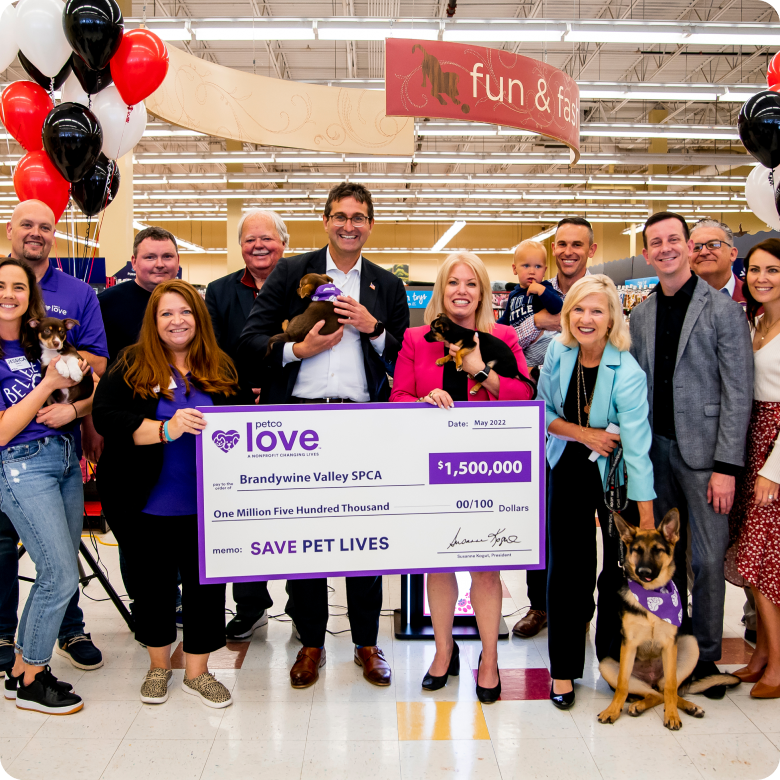
Petco Love (formerly the Petco Foundation) provides grants to animal welfare organizations across the country.
Amount: Varies
Eligibility: Organizations that should apply in this grant category are spay and neuter clinics, full service low-cost veterinary care providers, TNR/Community cat organizations, and organizations that provide financial aid for family pets.
Deadline: September 1 - 30, 2025
The grant is aimed at improving access to veterinary care, preventing economic euthanasia, and reducing the number of pets surrendered to shelters due to families’ inability to afford necessary treatments.
Successful programs typically include:
Low-cost vaccination clinics
Spay/neuter services
Basic veterinary care for low-income pet owners
Community outreach to connect pet owners with services
Application tip: Include data on how lack of veterinary care contributes to shelter intake in your community and how your program addresses this specific issue.
BTW, Grantboost’s AI platform helps nonprofits like animal welfare organizations create customized proposals that highlight your unique impact and programs.
The tool analyzes grant requirements and generates tailored responses that align with each funder’s priorities, saving you valuable time that can be redirected to animal care.

Amount: Varies
Eligibility: Organizations providing free vaccine services to communities in need
Deadline: Open year round
This grant funds vaccination clinics and programs that provide free or low-cost vaccines to pets in underserved communities, preventing disease and promoting public health.
Organizations should demonstrate:
Ability to reach underserved communities
Partnerships with veterinarians
Systems for tracking vaccinations administered
Follow-up care plans for animals with health issues
Application tip: Include statistics on preventable disease rates in your community and how your vaccination program addresses these specific issues.
Amount: Varies
Eligibility: Animal welfare organizations affected by disasters
Deadline: Expedited review during disasters; applications accepted year-round
The disaster relief grants provide emergency funding to rescue organizations for efforts during natural disasters, supporting evacuation, temporary sheltering, and reunification efforts. The funding helps organizations provide animal protection during emergencies.
To strengthen your application:
Document the scope of the disaster and its impact on animals
Outline your specific response activities
Demonstrate coordination with other emergency responders
Provide a clear budget for emergency expenses
Application tip: Develop relationships with Petco Love before disasters strike by applying for their other grant programs and establishing a track record of success.
For individuals and teams looking to secure more funding with less effort. Streamline your grant-writing process, stay organized, and achieve better results with proven templates and AI-driven support.

The Banfield Foundation, the charitable arm of Banfield Pet Hospital, offers several grant programs focused on veterinary care.
Amount: Varies
Deadline: Applications are accepted on a rolling basis and are reviewed monthly.
This grant provides funding for emergency and critical veterinary care for pets whose owners cannot afford treatment, helping keep pets with their families. By preventing “economic euthanasia,” these funds save lives and preserve the human-animal bond.
Amount: Varies
Eligibility: Must be employed by a Mars, Inc. company such as Banfield Pet Hospital, VCA Animal Hospitals, Blue Pearl.
Application Timing: Applications may be submitted at any time.
This grant supports programs that expand access to veterinary care in underserved and vulnerable communities, addressing barriers such as geography, economics, and cultural factors. These programs bring veterinary services directly to communities that otherwise lack access.
Amount: Varies based on disaster impact
Eligibility: Organizations responding to disasters affecting animals
Application Timing: Applications may be submitted at any time.
This grant provides emergency funding for animal rescue and disaster relief efforts during natural disasters, supporting evacuation, temporary sheltering, and medical care for affected animals. The quick review process allows organizations to respond rapidly during emergencies.
To prepare for disaster grant applications:
Develop a disaster response plan in advance
Build relationships with emergency management agencies
Train staff and volunteers in disaster response
Document disaster impacts thoroughly when they occur
Application tip: Include information about your organization’s disaster preparedness training and previous experience with emergency response.
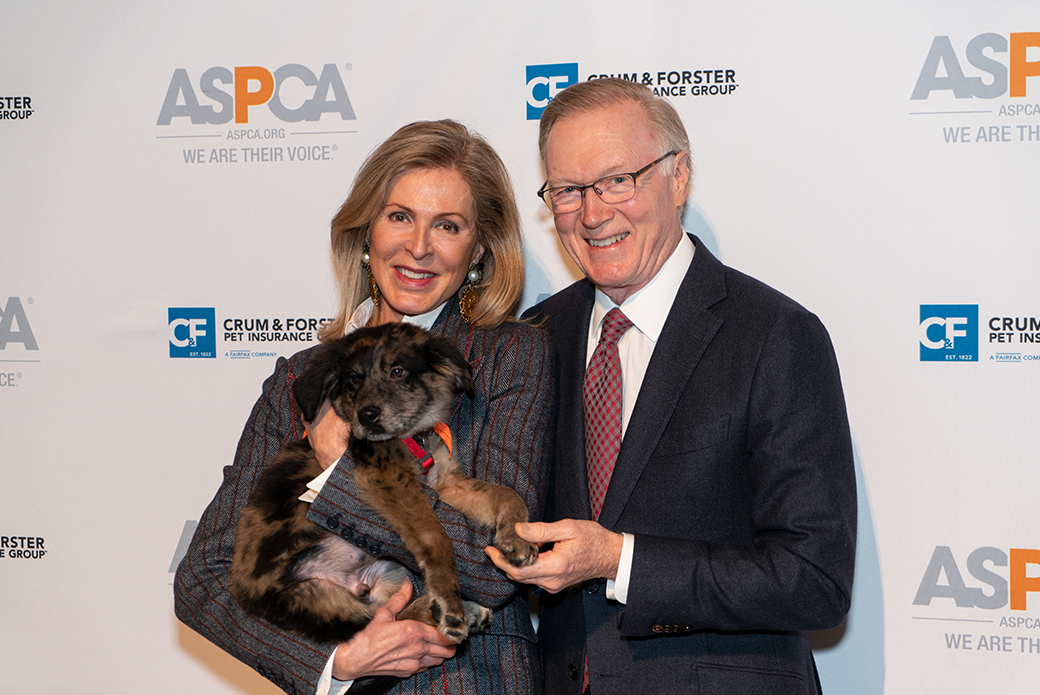
The American Society for the Prevention of Cruelty to Animals (ASPCA) offers several grant programs, including research funding.
Amount: Varies
Eligibility: Shelters in northern states facing unique challenges
Deadline: June 2, at 5 p.m. CT
This grant supports animal shelters in northern states that face unique challenges related to climate, geography, and population density, funding improvements in shelter operation, and community programs. These shelters often deal with harsh winters, rural populations, and limited resources.
Successful applications address challenges such as:
Winter housing and care requirements
Transportation barriers in rural areas
Limited access to veterinary services
Seasonal fluctuations in animal intake
Application tip: Clearly articulate the unique challenges your northern location presents and how the requested funding will address these specific issues.

The Grey Muzzle Organization focuses exclusively on improving the lives of senior dogs.
Amount: $1,500 to $25,000
Eligibility: Organizations with programs specifically for senior dogs
Deadline: Reopens February 2026
This grant funds programs that improve the lives of at-risk senior dogs, including medical care, hospice care, senior dog adoption programs, and keeping seniors with their families. Senior dogs are often overlooked in shelters and have special needs that require additional resources.
Successful programs include:
Senior-specific medical protocols
Marketing initiatives focused on senior adoption
Foster programs for hospice care
Support for owners to keep senior pets during financial hardship
Application tip: Include heartwarming success stories of senior dogs your organization has helped, along with data on outcomes and the specific challenges these animals face.
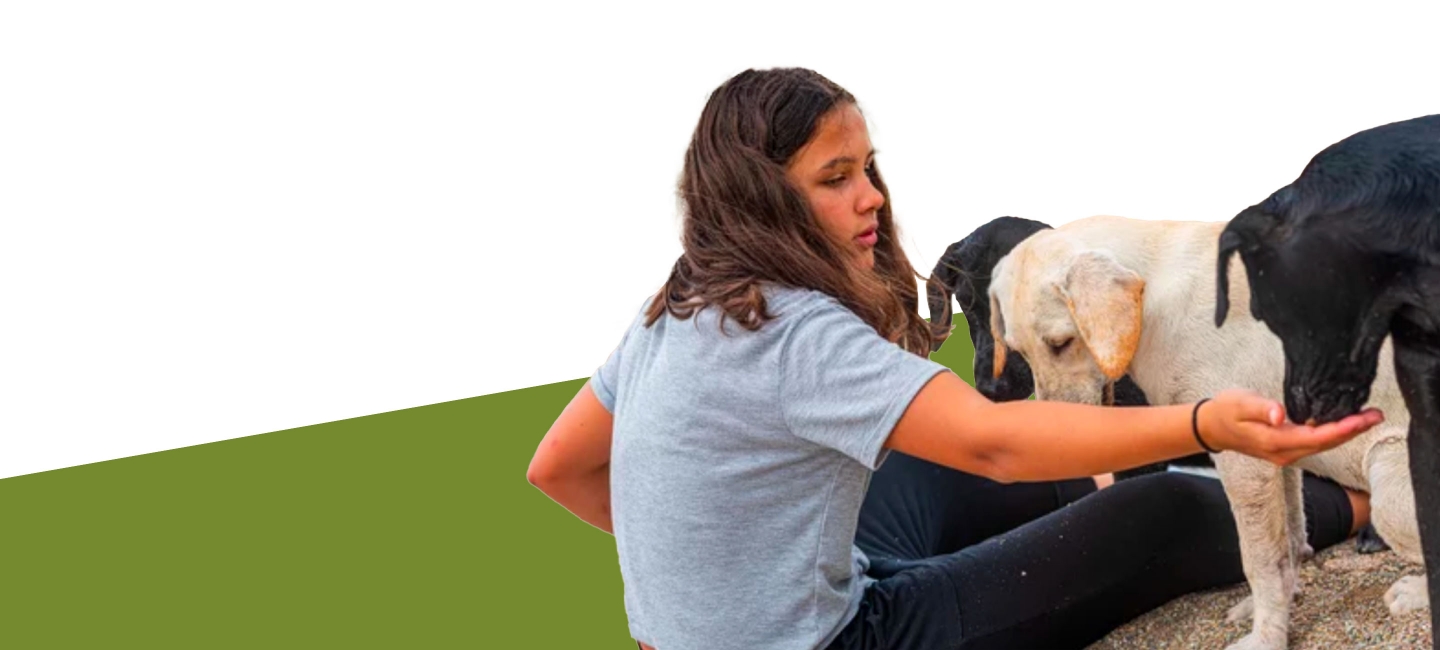
The Cold Noses Foundation supports various animal welfare initiatives with a focus on education and medical care.
Amount: $2,000-$5,000.00
Eligibility: Organizations with education, community outreach, or medical care programs
1st Quarter – Australia & Europe
Application Period: January 1 – January 31
Notification Date: February 28
Application Period: April 1 – April 30
Notification Date: May 31
Application Period: July 1 – July 31
Notification Date: August 31
Application Period: October 1 – October 31
Notification Date: November 30
This grant supports programs focused on education, community outreach, and medical care for animals in need, with an emphasis on sustainable, long-term impact. The foundation looks for programs that address the root causes of animal suffering rather than just symptoms.
Successful applications typically include:
Clear educational objectives
Strategies for reaching target audiences
Measurable outcomes
Plans for program sustainability
Application tip: Demonstrate how your program will create lasting change in community attitudes or behaviors toward animals.
Amount: Varies
Eligibility: Organizations with spay/neuter or TNR programs in Africa and Asia
1st Quarter – Australia & Europe
Application Period: January 1 – January 31
Notification Date: February 28
Application Period: April 1 – April 30
Notification Date: May 31
Application Period: July 1 – July 31
Notification Date: August 31
Application Period: October 1 – October 31
Notification Date: November 30
This grant provides funding specifically for spay/neuter and trap-neuter-return (TNR) programs in Africa and Asia, addressing overpopulation in regions with limited resources. These programs help control population growth in areas where animal welfare resources are scarce.
Effective applications include:
Data on local animal overpopulation issues
Partnerships with local organizations
Cultural considerations in program design
Sustainability plans for continuing the work
Application tip: Include information about local veterinary capacity and how your program will build this capacity over time.
Many grants are available for specific geographic area, providing targeted support for local animal welfare efforts.
Amount: $10,000+
Eligibility: Organizations in New York City and neighboring counties only
Deadline: Annual application deadline is July 1, 2025
This grant provides funding for animal welfare programs in the New York City metropolitan area, supporting a broad range of initiatives from direct animal care to community education. The foundation focuses on programs that address the unique challenges of urban animal welfare.
Effective applications address issues such as:
High-density housing challenges for pet owners
Access to veterinary care in underserved neighborhoods
Community education in diverse populations
Collaboration with other NYC-area organizations
Application tip: Highlight your organization’s understanding of the unique animal welfare challenges in New York City and how your program addresses these specific issues.
Some grants focus on specific aspects of animal welfare or unique needs within the field.
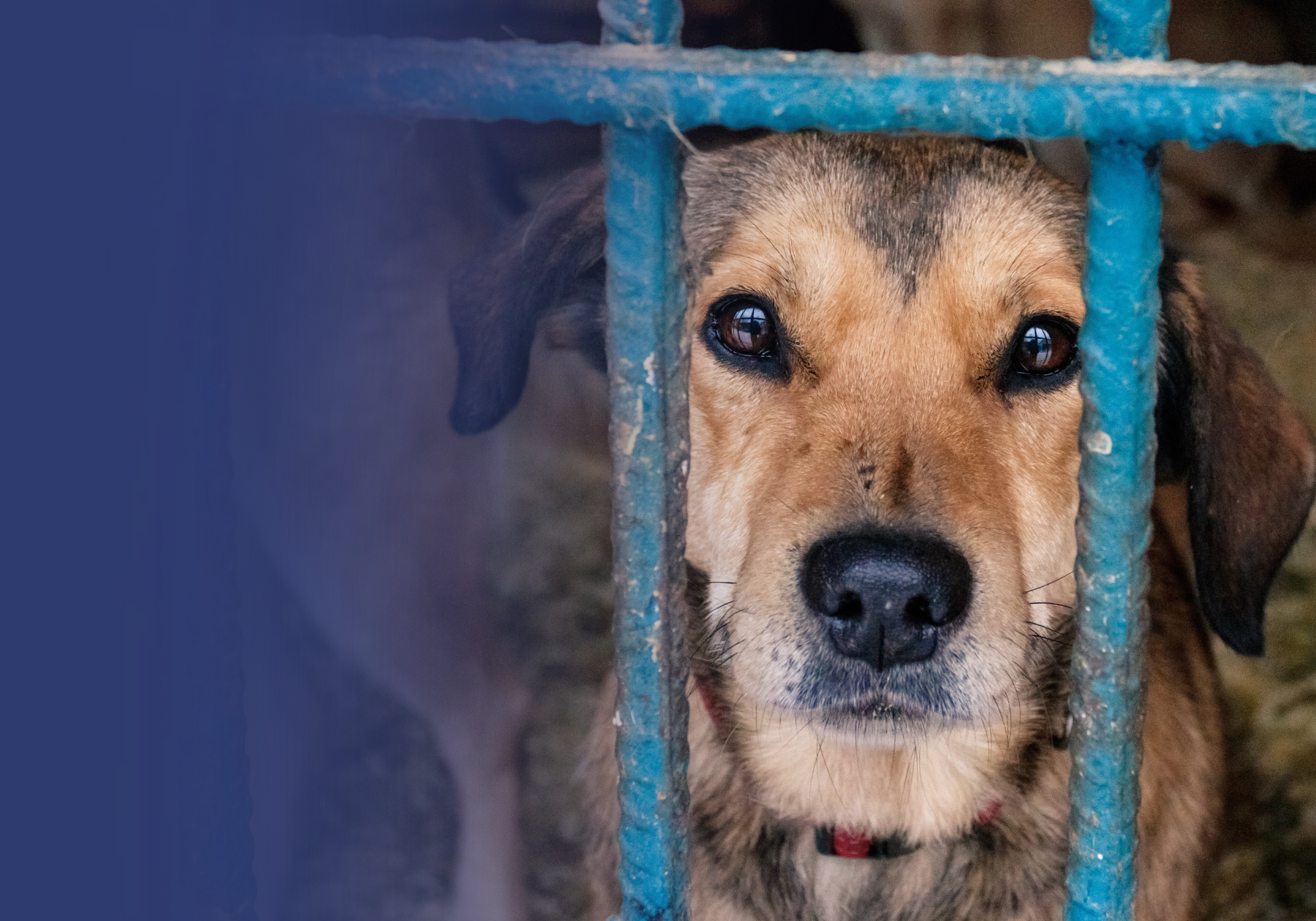
Amount: Varies (case-by-case basis)
Eligibility: Organizations providing specialized medical care
Deadline: Applications are accepted and reviewed on the 1st and 15th of each month.
This grant supports the rehabilitation of animals that require extraordinary medical care before they can be adopted, giving these animals a second chance at finding loving homes. The funding helps organizations take on complex medical cases that might otherwise be beyond their resources.
Successful applications include:
Detailed medical diagnosis and treatment plan
Veterinary estimates for care
Prognosis for recovery and adoptability
Photos of the animal (when appropriate)
Application tip: Include a letter from your veterinarian detailing the treatment plan, expected outcomes, and why this case deserves special consideration.
Amount: $500-$2,500
Eligibility: 501(c)(3) animal welfare organizations
Application Deadlines:
Spring Cycle: March 15, 2025
Fall Cycle: September 15, 2025
Founded by professional athletes passionate about animal welfare, this grant supports various animal rescue initiatives with a focus on community impact and sustainability. The organization looks for programs that create lasting change in animal welfare.
Effective applications demonstrate:
Clear program objectives
Measurable outcomes
Community engagement
Sustainability beyond the grant period
Application tip: Highlight any connections to sports or athletics in your community, as this aligns with the foundation’s founding mission.
Amount: $1,000
Eligibility: By invitation only; available to organizations that have previously received a First Steps Grant and have demonstrated success and sustainability.
Deadline: Typically in the first quarter following the award of the First Steps Grant.
This grant offers additional support to previous grant recipients who have demonstrated success and are ready to expand their programs or services. The foundation invests in organizations that have proven their ability to use funds effectively.
To position your organization for this grant:
Implement your First Steps grant effectively
Document outcomes and impact
Maintain communication with the foundation
Develop clear plans for program expansion
P.S. These aren’t all the grants available currently. We also recommend you check out Rachael Ray Save, Friends Animal Society, Pedigree Foundation, and government agencies to explore additional funding opportunities that support animal rescue efforts.
Managing multiple grant applications with varying requirements and deadlines can be overwhelming for animal rescue organizations already stretched thin with daily operations. Using AI-powered tools like Grantboost can significantly improve your grant application process and increase your success rate.

Grantboost helps animal rescue organizations create tailored grant proposals based on their specific details and grant opportunities. By completing a simple survey about your mission and funding goals, Grantboost’s AI can analyze grant opportunities and craft effective responses that incorporate proven grant writing strategies.
Key benefits for animal rescue organizations include:
Time savings on administrative tasks, allowing more focus on animal care
Customized proposals that highlight your organization’s unique impact
Incorporation of industry best practices in grant writing
Streamlined collaboration among team members working on proposals
Improved application quality through AI-powered insights
Read Next:
One of the most effective strategies for managing multiple grant opportunities is to create a comprehensive grant calendar. This tool helps you track application deadlines, reporting requirements, and follow-up activities.
To create an effective grant calendar:
List all potential grants - Include both those you’re currently applying for and those you might pursue in the future
Note key dates - Record application deadlines, notification dates, and reporting deadlines
Track requirements - Document specific requirements for each grant, such as eligibility criteria and required attachments
Assign responsibilities - Designate team members responsible for each application
Set internal deadlines - Create deadlines for draft completion, review, and submission that are earlier than the actual deadline
Pro tip: Set calendar reminders at least 30 days before each grant deadline to ensure adequate preparation time. For annual grants, set reminders to begin preparing 60-90 days in advance.
The narrative portion of your grant application tells your organization’s story and makes the case for funding. A compelling narrative should:
Clearly define the problem - Use data and specific examples to illustrate the animal welfare issues you’re addressing
Demonstrate your solution - Explain your approach and why it’s effective
Showcase your impact - Use metrics and success stories to demonstrate your organization’s effectiveness
Highlight your uniqueness - Explain what sets your organization apart from others
Connect to the funder’s priorities - Show how your work aligns with the foundation’s mission and goals
Example impact metrics to include:
Number of animals rescued annually
Adoption rates and average length of stay
Veterinary procedures performed
Return-to-owner rates
Community outreach activities and participation
Volunteer hours contributed
Cost per animal served
Having key documents prepared and organized before you begin applying for grants will streamline the process and reduce last-minute stress. Create a digital folder with:
Organizational documents
501(c)(3) determination letter
Board of directors list with affiliations
Mission statement and brief organizational history
Annual report or organizational overview
Strategic plan (if available)
Financial documents
Most recent audited financial statements
Current year operating budget
IRS Form 990 for the past two years
Financial policies and procedures
Program information
Program descriptions and outcomes
Statistics on animals served
Success stories and testimonials
Photos and videos of your work (with proper releases)
Evaluation methods and results
Supporting materials
Letters of support from partners
Media coverage of your organization
Volunteer and staff biographies
Facility information and photos
Pro tip: Create both PDF and editable versions of these documents so you can easily copy information into online application forms or attach them as needed.
Read Next:
The Art of the Ask | Writing the Letter of Inquiry for a Grant6/10/2023
Writing a Letter of Support for Grants: Examples and Frameworks
Funders increasingly expect detailed reporting on how their grants were used and what impact they had. Establishing systems to track outcomes from the beginning will make reporting easier and strengthen future applications.
For each grant you receive:
Document baseline metrics - Record the starting point for the metrics you plan to improve
Set up tracking systems - Create spreadsheets or use software to track relevant data
Take “before” photos - Document conditions before implementing grant-funded improvements
Collect testimonials - Gather quotes from staff, volunteers, and adopters about the impact
Schedule regular check-ins - Review progress monthly to ensure you’re on track
Example tracking metrics for a spay/neuter grant:
Number of surgeries performed
Demographics of clients served
Cost per surgery
Reduction in intake of unwanted litters
Community feedback and testimonials
After reviewing hundreds of successful grant applications and speaking with foundation representatives, we’ve compiled these key strategies to increase your chances of securing funding.
Before applying for any grant, take time to understand the funder’s:
Mission and values
Funding priorities
Average grant amounts
Types of organizations typically funded
Geographic focus
Review their annual reports, previously funded projects, and any published guidelines. This research will help you tailor your application to align with their specific interests and requirements.
Pro tip: Follow potential funders on social media and subscribe to their newsletters to stay informed about their current priorities and initiatives.
Many foundations prefer to fund organizations they already know. Whenever possible:
Attend funder webinars and information sessions
Reach out to program officers with specific questions
Invite foundation representatives to visit your facility
Connect with current grantees to learn about their experience
These connections can provide valuable insights into what the funder is looking for and help your application stand out.
Funders want to know that their investment will have a significant impact. In your application, address:
How the program will continue after grant funding ends
Additional funding sources you’re pursuing
How the grant will help build your organization’s capacity
Plans for evaluating and improving the program over time
Be realistic about what you can accomplish with the requested funding and demonstrate that you’ve thought beyond the grant period.
While data is important, stories bring your work to life. Include:
Brief case studies of animals you’ve helped
Testimonials from adopters or community members
Before-and-after narratives that illustrate impact
Stories that demonstrate the specific need you’re addressing
Balance emotional appeal with factual information to create a compelling case for support.
Pro tip: Include 1-2 high-quality photos that illustrate your work, but make sure they’re appropriate and respectful. Avoid overly graphic images that might alienate reviewers.
One of the simplest ways to improve your chances is to follow application instructions exactly:
Adhere to word or character limits
Answer all questions completely
Include all requested attachments
Use the specified format for budgets and timelines
Submit by the deadline (or preferably earlier)
Many foundations use strict adherence to instructions as an initial screening tool. Don’t give them a reason to eliminate your application before it’s even reviewed.
Your budget should be:
Aligned with the narrative portion of your application
Detailed enough to show thoughtful planning
Reasonable and cost-effective
Clear about how each expense relates to program outcomes
Include notes explaining any unusual expenses or assumptions you’ve made in your calculations. If you’re requesting partial funding for a larger project, clearly indicate which components the grant would support.
Many funders prefer to support collaborative efforts that leverage resources and expertise from multiple organizations. When appropriate, highlight:
Partnerships with other animal welfare organizations
Relationships with veterinarians or veterinary schools
Collaborations with community organizations
Participation in coalitions or networks
These connections show that you’re working efficiently and maximizing impact through cooperation rather than competition.
Don’t shy away from discussing potential obstacles or challenges in your application. Funders appreciate honesty and want to see that you’ve thought through potential difficulties. For each challenge:
Explain the potential issue
Describe your plan for addressing it
Identify resources you can draw on for support
Show how you’ve overcome similar challenges in the past
This demonstrates thoughtful planning and risk management, increasing funders’ confidence in your ability to succeed.
Simple errors can undermine your credibility. Before submitting:
Have at least two people review the application
Check for spelling and grammar errors
Verify that all numbers add up correctly
Ensure consistency in terminology and formatting
Confirm that all attachments are included and properly labeled
Consider having someone unfamiliar with your organization review the application to ensure it’s clear to someone without insider knowledge.
Not every application will be funded, but each rejection is a learning opportunity:
Request feedback from the funder if available
Review your application objectively to identify weaknesses
Consider whether the grant was truly a good fit
Apply improvements to future applications
Don’t get discouraged—many successful organizations face multiple rejections before securing funding
Persistence and continuous improvement are key to grant-seeking success.
Read Next:
Animal rescue grants offer tremendous opportunities for organizations to expand services, improve animal care, and increase adoption rates. But as you’ve seen, the application process is complex and competitive.
The good news? You don’t have to navigate this process alone. Grantboost’s AI-powered grant writing platform is specifically designed to help teams like animal rescue organizations create compelling grant applications in a fraction of the time.
Start your free trial today and see how much time you can save on your next animal rescue grant application!
For individuals and teams looking to secure more funding with less effort. Streamline your grant-writing process, stay organized, and achieve better results with proven templates and AI-driven support.